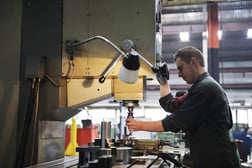
Artificial intelligence (AI) has become a transformative force in multiple industries, including manufacturing. AI in manufacturing has introduced a significant change in the industry with its potential to impact production, improve efficiency, and drive innovation.
AI in Manufacturing Applications
AI has numerous applications in manufacturing, revolutionizing various aspects of the industry. Some key applications of AI in manufacturing include:
Quality Control Processes: AI-powered computer vision systems enable manufacturers to automate quality control processes. Advanced image recognition and machine learning algorithms can detect defects and anomalies in products with higher accuracy and speed. This ensures consistent product quality, reduces waste, and improves customer satisfaction.
Optimize Supply Chains: AI can optimize supply chain operations by analyzing vast amounts of data, such as historical demand, inventory levels, and external factors like weather patterns and market trends. This enables manufacturers to make data-driven decisions regarding procurement, production planning, and logistics, improving efficiency and cost savings.
Robotics and Automation Systems: AI is driving the development of intelligent robots and automation systems in manufacturing. These robots can precisely perform complex tasks, adapt to changing environments, and work alongside human operators, increasing productivity, safety, and flexibility on the factory floor.
Product Designs: AI algorithms can analyze data from multiple sources, including customer feedback, market trends, and historical performance, to optimize product designs. This enables manufacturers to develop products that better meet customer needs, reduce time-to-market, and enhance competitiveness.
Employee Safety: AI-powered systems can monitor worker activities, detect potential safety hazards, and provide real-time alerts or suggestions for safer practices. It helps create a safer working environment, reduces workplace injuries, and improves ergonomics.
Customer Service: AI-based chatbots and virtual assistants can handle customer inquiries, provide product recommendations, and offer personalized support. This improves customer service, enhances customer experience, and increases customer satisfaction.
Benefits of AI in Manufacturing
The integration of AI in manufacturing offers several compelling benefits:
Higher Efficiency: AI-powered systems can automate repetitive tasks, enabling manufacturers to focus on higher-value activities. This leads to increased operational efficiency, reduced cycle times, and higher productivity levels.
Better Quality Control: AI-driven quality control systems can detect defects and energy with greater accuracy and speed than manual inspections. This results in higher product quality, reduced scrap rates, and lower rework costs.
Lower Costs: AI technologies like predictive maintenance optimize equipment maintenance schedules, reducing unplanned downtime and maintenance costs. Additionally, AI-based supply chain optimization minimizes inventory holding costs and streamlines logistics, leading to cost savings.
Improved Decision-Making Capabilities: AI systems analyze vast amounts of data and generate actionable insights, enabling manufacturers to make data-driven decisions. This enhances operational agility, enables faster problem-solving, and improves overall decision-making processes.
AI Manufacturing: The Bottom Line
AI is reshaping the manufacturing industry by driving automation, enhancing efficiency, and enabling data-driven decision-making. By leveraging AI technologies across various applications, manufacturers can unlock new levels of productivity, quality, and innovation. While challenges exist, addressing them and staying abreast of future trends will enable manufacturers to capitalize on the full potential of AI in manufacturing and gain a competitive edge in the global market.
However, with this potential comes work on the front end. Integrating AI into your warehouse operations means more data. Effectively managing and utilizing this data necessitates the implementation of appropriate enterprise resource planning (ERP) and other business software solutions specifically designed for warehouse and manufacturing businesses.
PositiveVision has been assisting businesses in the Greater Chicago area for more than 20 years. We ensure that we always make our clients’ goals a priority when discussing AI in manufacturing or recommending an ERP solution. Contact us to speak to one of our product experts today.


 © 2019 PositiveVision • 219 E. Thorndale Ave. Roselle, IL 60172
© 2019 PositiveVision • 219 E. Thorndale Ave. Roselle, IL 60172